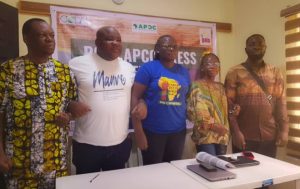The Global Alliance for Incinerator Alternatives (GAIA) has urged African leaders to prioritise sustainable practices through people-centred renewable energy that protects ecosystems and supports local economies.

GAIA is a multidisciplinary, and multicultural team on a mission to catalyse global shift towards environmental justice by strengthening grassroots social movements that advance solutions to waste and pollution.
Mr Anthony Akpan, President, PAN African Vision for the Environment, said this at a news conference on Saturday, October 12, 2024, in Lagos.
Akpan said that the meeting was to set an agenda for African leaders ahead of the forthcoming United Nations Climate Change Conference (UNFCCC COP29), which would be held in November in Baku, Azerbaijan.
He said a shift to renewable energy within Africa must be supported as a priority before exporting Africa’s resources for the Global North’s transition.
“Renewable energy projects must be socially owned and benefit local communities before industry.
“The transition must be grassroots-driven, ensuring that policies prioritise the well-being of people and the environment, not corporate profits,” he said.
Akpan demanded an end to waste colonialism, stressing that Africa was not a dumping ground.
“It is, therefore, paramount for us as Africans to adapt to the Global Plastics Treaty which allows us to address plastic pollution across its lifecycle, from extraction to production to disposal,” he said.
He urged African leaders to demand solutions that would address migration and climate-induced displacement, climate debt, reparations, and economic reforms.
According to him, African governments must embrace food sovereignty by prioritising local food crops over cash crops and promoting seed preservation methods that resist Genetically Modified Organisms.
Similarly, Mr. Philip Jakpor, the Executive Director, Renevlyn Development Initiative, said the Global South, especially Africans, should lead actions that remedy the climate crises in a manner that is just and holistic.
“African people are standing in solidarity to speak and defend the rights of Africans to a safe environment conducive to our growth and progress.
“Even in the face of the environmental, social, and economic devastation escalated by the climate crisis particularly experienced in Africa,” he said.
Jakpor said the demands were the outcome of the African People’s Counter COP (APCC) meeting held in October in Senegal, highlighting the impacts of climate change on African communities.
He said that the APCC showcased viable alternative solutions that have emerged through knowledge sharing and activism from grassroots African communities, experts, activists and CSOs.
“The APCC recognises that African voices have largely been excluded from the United Nations Framework Convention on Climate Change Conference of Parties (UNFCCC COP) which has been captured by Global North states and corporations that continue to fuel the climate crises while falsely claiming to solve the causes of climate change,” he said.
Jakpor said the effects of climate change were not just statistics or forecasts as it directly affected lives.
“As people of Africa, we demand climate justice for Global South communities at the centre of the climate crisis.
“The Global North Nations who have contributed the most to the crisis must lead the process of cutting emissions at source and fund the needed energy transition as payment for the climate debt owed to the Global South.
“We call for reparations, remediation and compensation to the impacted peoples of Africa.
“We denounce all forms of false solutions to climate change such as REDD+, Net zero, and Geo-engineering which further entrenched the climate crises,” he said.
Also, Ms. Elvira Jordan, Media Advisor, Community Development Advocacy Foundation, called for an end to all forms of fossil fuel exploration, extraction and production across Africa.
Jordan said that fossil fuel companies must pay for the rehabilitation of degraded land, oceans and rivers resulting from hydrocarbon extraction.
“When we talk about oil extractions in Africa, we’re not just talking about crude oil. We’re talking about the mining of coal and other minerals.
“Now, in Africa, just like we are well aware of here in Nigeria and the Niger Delta, where we have those communities that have been deprived of their source of livelihood, they’ve been deprived of their environment because of crude oil extraction.
“You see communities who are suffering from deep levels of poverty, they have little or no medical care in their communities, no schools, in fact, infrastructures there are almost at zero per cent,” she said.
Civil society organisations that supported the demands are Sustainable Research and Action for Environmental Development, Environmental Defenders Network, and Policy Alert, among others.
By Oluwafunke Ishola
